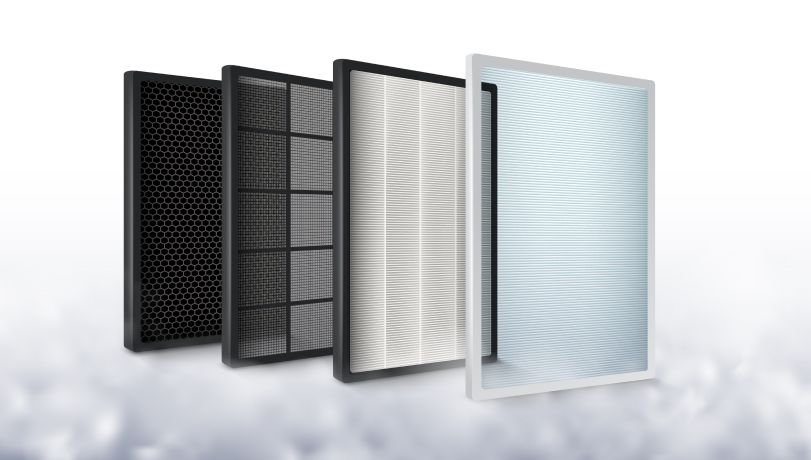
Air Filtration Tips and Tools for your Home
Air filters are an essential aspect of your home. They allow you to keep the air that circulates through your home clean and free from harmful particles. The importance of using high quality air filters and caring for these filters effectively is recognized by the fact that poor air quality can cause you and your family to develop a wide range of health issues. Caring for your home's air filters is less complicated than you might believe, which is particularly true if you make use of these tips and guidelines.
Different Types of Home Air Filters
When you are changing your current air filter, you should be aware of the several different types of filters available. All of which come with different performance levels and have distinct maintenance requirements. The three types available for you include fiberglass, pleated, and electrostatic options. There is also a permanent electrostatic option for you to consider.
The disposable fiberglass air filters are designed mainly to collect large particles and substances that include dirt, lint, and dust.These particular filters are considered to be among the most affordable options that you can choose from.
The pleated filter can catch both large and small substances, the latter of which includes such substances as spores and mites. These specific filters usually need to be changed more frequently than the others.
The disposable electrostatic filters are comprised of fabrics that have been electrically charged, which are designed to capture a high amount of small and large particles that encounter the filter. Disposable electrostatic filters are largely considered to be among the most effective options available. The permanent electrostatic filter consists of fibers that have been charged similarly to their disposable counterparts. The primary difference between the two varieties is that the permanent version does not typically capture as many particles and substances. These filters can be washed and are designed to be used for anywhere from 5-8 years before needing to be changed.
Focus on Efficient Filters
When you've decided to purchase a new air filter for your home, your primary focus should be on selecting efficient filters. The best way to do so is by following an efficiency rating known as MERV, which was developed in 1987 as a means of testing the efficiency of air filters. In most cases, more efficient filters will cost you more money. However, these filters are designed to save you a substantial amount of money in the long run. Thus, you will usually save money when selecting a more efficient filter. All home air filters that are used in combination with heaters or air conditioners come with a MERV rating on a scale that extends from 1-16. Higher numbers equate to more efficient filters. It's possible for filters to come with even higher ratings that range from 17-20. However, these specific filters are not designed to be used in residential properties such as homes. If you want the air quality within your home to remain at a high level, it's recommended that you choose a filter with a rating of at least six or higher. By selecting a filter with a rating that's lower than six, the filter itself won't be able to trap enough dust and dirt to keep your air clean. Given that filters with higher ratings will trap more particles than ones with lower ratings, you may want to select one that has a rating that's lower than 14. Anything in the 14-16 range will trap a large number of particles to the point where the airflow within the filter is lowered unless you clean them on a consistent basis.
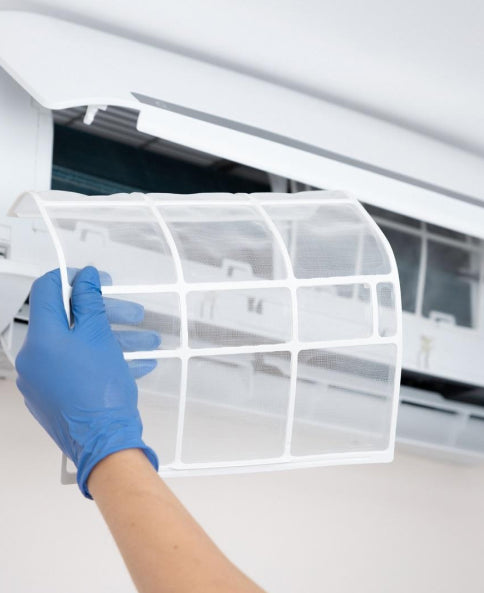
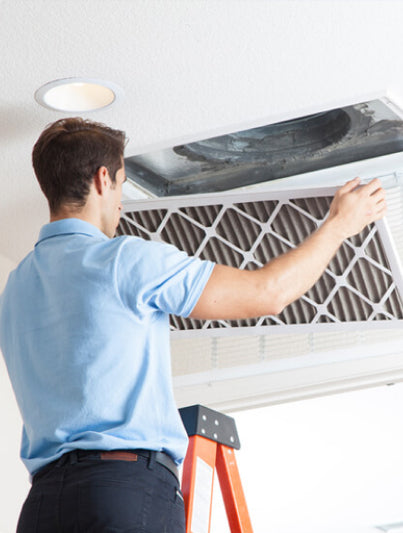
Some Issues to Avoid When Buying Air Filters
When you are searching for the most efficient filter to place in your home, there are a variety of issues that you will want to avoid in order to make sure that you select a filter that will increase your efficiency while also saving you money. It's important to understand that higher efficiency filters are typically thicker than their lower efficiency counterparts. Your furnace likely has a slot that is designed to accommodate filters with a thickness of around one-inch, which is the standard thickness of most filters. However, high efficiency filters are usually thicker and can be as thick as four inches, which means that they may be unable to fit within your furnace without requiring you to make some alterations that could be costly. When an air filter doesn't fit like it should, it's possible for particles to get through the filter and circulate into the air within your home.
Higher efficiency air filters that get close to the 15-16 rated models can actually reduce the airflow in your house due to the tightness of the weave of the filter. This could cause your monthly energy bills to increase as opposed to lowering, which is the usual reaction when you've purchased a more efficient filter. You should also know the costs for filters with a MERV rating of 15 or 16 will typically be substantially higher than filters with a rating of 10 or 11. The filters with a high MERV rating may not provide enough benefits to outweigh the extra costs. Although a 15 or 16 rating will allow the filter to capture more particles, a rating of 10 or 11 will still capture enough particles so as to keep your air clean and purified. A MERV 8 filter can trap particles as small as mold spores and hair spray.
Make Sure to Change Filter Regularly
The most important facet of caring for your home's air filters is to change them regularly- unless you are using permanent electrostatic versions. For any disposable option, it's recommended that you change the filter at least once every three months, which will allow you to maximize the efficiency of your filters. The primary reason why it's so important to change your filters regularly is because of the issues that can occur when using a filter that has become dirty and no longer circulates air properly. For one, your air conditioner or heater system will not be able to operate as efficiently as it should. You will also have higher monthly energy bills that will end up costing you a substantial sum of money. Some additional issues include: problems with your indoor air quality, particles in the air not being caught properly, an increase in your carbon footprint, and needing to make additional repairs with your HVAC system. All of these issues can be avoided if you change the filters on a regular basis and take some steps to maintain the filters in the months between each change.
Additional Maintenance Tips to Consider
One factor that should determine how often you change your filters is whether or not you suffer from any allergies. Although it's recommended that you change your filters every three months, the presence of allergies in one or more occupants of the home means that you should probably change the filters more often than is recommended. By doing so, you will be able to rid your home of any allergens in the air more effectively. If you don't change the filter more often, it may become too dirty to properly capture the allergens that are affecting your health.
You should also change your filter more often if there are pets in your household. Most dogs and cats will shed, which means that their hair will get into your filter. If the filter is left unchanged, the performance of your standard heating unit or HVAC system could become compromised. How often you change the filter depends on how many animals are in your house. The best way to avoid issues where the filter becomes too dirty is to perform checks on the filter at least once every month, which should help you catch possible issues before they become larger problems. You should also keep in mind that animals will invariably shed more during the warmer summer months, which means that this is the time of the year when you may need to change the filters more often than usual.
If you have one of the permanent electrostatic filters, you will only need to change the filter after 7-8 years. However, the filter will still need to be cleaned on a regular basis. One look at your filter may dissuade you of doing so. However, the process is much easier than you might imagine. You should focus on cleaning these filters at least once every month because the airflow through the filter can become worse as dirt and dust builds up. The first thing you need to do is to remove the filter from its housing. Make sure to do so gently so that the filter remains in good shape.
You should then rinse the filter in either a bathtub or a sink. A soft brush should be enough to remove all the particles that have become stuck on the filter. For stubborn particles and substances, consider pairing the brush with a small amount of detergent. After the dirt has been completely removed, you should shake the filter so that any excess water is drained from the fibers. Once you have placed the filter back into the system, the air that passes through it will dry it completely, which allows you to avoid having to dry it yourself. Overall, the cleaning process should take you around 10-15 minutes at most.
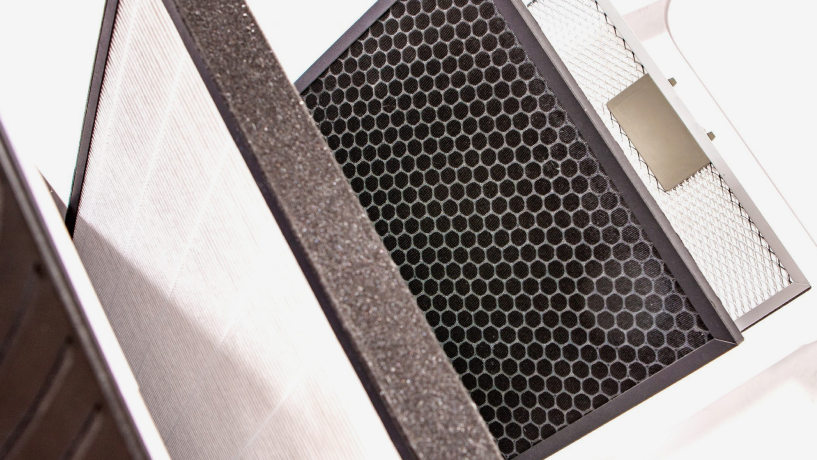
Filters
Air filtration should be an essential aspect of your home. Even if your house seems to be sparkling clean, the air can still be filled with invisible contaminants. Purification systems allow you to keep the air that circulates through your home clean and free from harmful particles such as dust, smoke, pet dander, allergens and odors. If you or anyone in your home suffers from allergies, asthma or another respiratory issue, air purification systems can provide you with much-needed relief.
The gold standard in air filters are called HEPA filters, which stands for High Efficiency Particulate Air. These filters can remove up to 99.7% of contaminates from the air, including mold, spores, dust mites, and pollen. HEPA air purifiers work by using a fan to draw air into a pleated filter. Most HEPA systems also have a type of pre-filter, which traps larger particles such as dust and hair and helps prolong thelife of the HEPA filter.
When choosing an air purification system, keep in mind the size of the room you intend to use it in and be sure to pick one that corresponds. You’ll want to use an air purifier in the rooms where you and your family spend the most time, like the living room or bedroom. Consider performance, noise level, and ease of use as well. Place an air purifier in the kitchen to reduce cooking odors and unpleasant fumes.
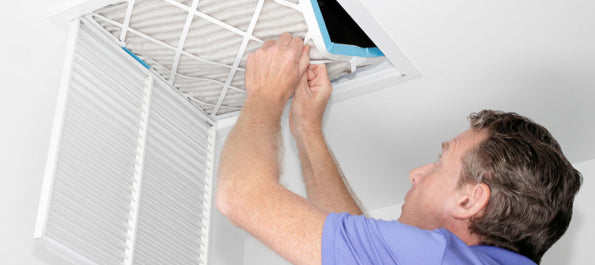
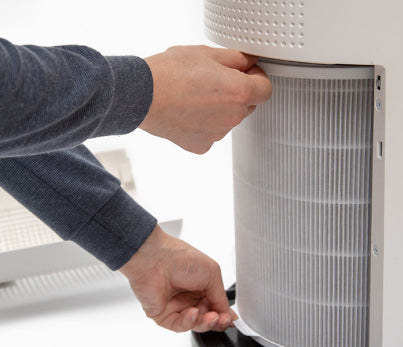
Once you choose your filtration system, be sure to keep it running at its best by cleaning and replacing the filters regularly. HEPA filters should be replaced about every 12 months, carbon filters every three to six months, and pre-filters should be cleaned or replaced more frequently, about every 2 months or earlier. Check your filters any time you notice a decrease in performance from your air purification unit. With an air purification system and replacement filters from LifeSupplyUSA, you’ll be breathing easy. We carry replacement filters for a wide variety of air purifiers, at prices that’ll make you smile. Visit us at lifesupplyusa.com or check out our Amazon storefront and start saving!
Do you have questions about this product?
Our customer service agents are here to help!
CHAT NOW